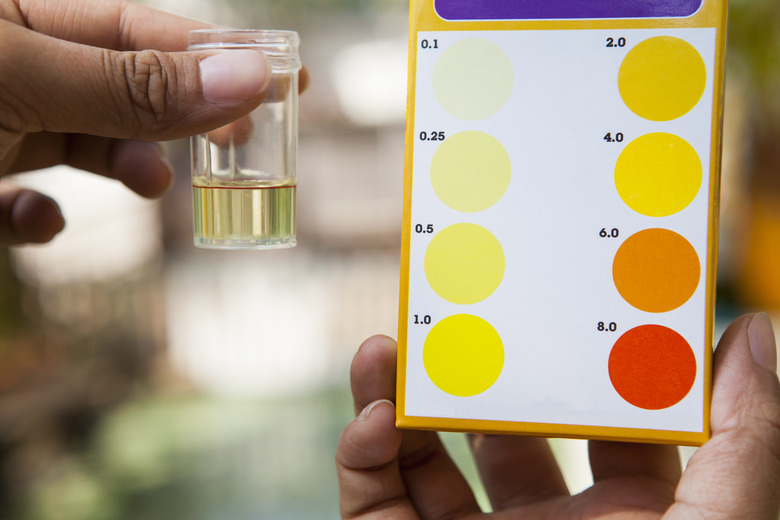How To Calculate Hydrogen Ion Concentration
Hydrogen ion concentration tells us how acidic or basic any given solution is. More hydrogen ions? More acidic. Fewer hydrogen ions? More basic. Pretty simple, right? Let's take a look at how to define and calculate hydrogen ion concentration. First, you'll see how you get hydrogen ions and hydroxide ions in water.
Self-Ionization of Water
Self-Ionization of Water
Water self-ionizes to a small extent:
\(H_2O\enspace \leftrightarrows\enspace H^+\enspace +\enspace OH^-\)
This is a simplification, as free hydrogen ions don't actually exist in solution. This is what it actually looks like:
\(H_2O\enspace + H_2O\enspace \leftrightarrows\enspace H_3O^+\enspace +\enspace OH^-\)
Through hydrogen bonding, the hydrogen ion associates with a water molecule to create H3O+, or hydronium. Thus when you calculate the hydrogen ion concentration, you are also calculating the hydronium ion concentration.
For water, the water ion product or **Kw** tells us the concentration of H+ or H3O+ and the concentration of OH- or hydroxide ions.
\(K_W\enspace =\enspace [H^+][OH^-]\)
At 25 degrees Celsius, the experimentally determined value of KW is 1.0 x 10-14 M2.
Let's take a look at how you can use your knowledge of dissociation and KW to calculate the hydrogen ion concentration for either strong acids or bases.
Calculating the Hydrogen Ion Concentration From Molarity of a Strong Acid
Calculating the Hydrogen Ion Concentration From Molarity of a Strong Acid
A strong acid increases the hydrogen ion concentration over hydroxide ions present.
An example is HCl:
\(HCl\enspace (g)\enspace \longrightarrow\enspace H^+\enspace (aq)\enspace +\enspace Cl^-\enspace (aq)\)
Since HCl is a strong acid, it dissociates completely in water. So, let's say that you have a 1.5M HCl solution. What is the hydrogen ion concentration?
Well, this is pretty simple and doesn't even require any math! Since the acid dissociates completely the hydrogen ion concentration is the same as the molarity of the solution. In this case that means the concentration of hydrogen ions, or [H+], is 1.5M.
A strong base, on the other hand, has more hydroxide ions than hydrogen ions. Let's say that you have a 0.1M solution of NaOH. What is the concentration of H+ in this case? Now, you're going to need to use your knowledge of KW.
\(K_W\enspace =\enspace [H^+][OH^-]\)
You know that since this strong base dissociates completely, the hydroxide, or OH-, concentration is equal to the molarity of the solution. [OH-] = 0.1 M.
So,
\(1.0*10^-14\enspace M^2 =\enspace [H^+]*0.1M\)
Solving for [H+] you get:
\([H^+]\enspace =\enspace 10^-13\enspace M\)
This makes sense! Since it is a basic solution there are way more hydroxide ions than there are hydrogen ions.
Calculating the Hydrogen Ion Concentration From pH
Calculating the Hydrogen Ion Concentration From pH
Now, dealing with scientific notation all the time to discuss hydrogen ion concentration is a little cumbersome. Instead, scientists use the pH scale.
Here is the definition of pH:
\(-log[H^+]\enspace =\enspace pH\)
pH is the negative log of the hydrogen concentration. The letter p literally means negative log.
So, given a pH value of 5.5 you can find the hydrogen ion concentration:
\(-log[H^+]\enspace =\enspace 5.5\)
Diving by negative one and taking the inverse log gives you:
\(10\raisebox{0.5em}{$-log[H^+]$} \enspace =\enspace 10\raisebox{0.5em}{$-5.5$}\)
Solving, you get:
\([H^+] = 3.2\enspace \times\enspace 10\raisebox{0.5em}{-6}\enspace M\)
The hydrogen ion concentration of a solution with pH = 5.5 is 3.2*10-6M. See, this is why talking about a pH is much easier than the whole long number you got for an answer! A pH of 5.5 tells you about acidity, and you can calculate the molarity if you need it.
What Do pKa Values Mean?
What Do pKa Values Mean?
While calculating the concentration of hydrogen ions of strong acids is easy enough since they dissociate completely in solution, calculating the concentration of hydrogen ions in weak acids is just a little trickier. These acids do not completely ionize in water. Each acid has a tendency to lose a hydrogen ion in an aqueous solution. A stronger acid is more likely to lose its hydrogen ion than a weak acid.
Equilibrium constants for ionization reactions are calls acid dissociation constants (Ka). Stronger acids have a higher Ka while weaker acids have a lower Ka. Now, just as with hydrogen ion concentration, where you made the switch to pH instead of just H, scientists use pKa to indicate how strong or weak an acid is. With a higher tendency to lose a proton, the acid is stronger, and so the pKa is smaller.
TL;DR (Too Long; Didn't Read)
The higher a pKa value, the weaker the acid; the lower the pKa value the stronger the acid.
Cite This Article
MLA
Gupta, Riti. "How To Calculate Hydrogen Ion Concentration" sciencing.com, https://www.sciencing.com/calculate-hydrogen-ion-concentration-5683614/. 1 February 2020.
APA
Gupta, Riti. (2020, February 1). How To Calculate Hydrogen Ion Concentration. sciencing.com. Retrieved from https://www.sciencing.com/calculate-hydrogen-ion-concentration-5683614/
Chicago
Gupta, Riti. How To Calculate Hydrogen Ion Concentration last modified March 24, 2022. https://www.sciencing.com/calculate-hydrogen-ion-concentration-5683614/
